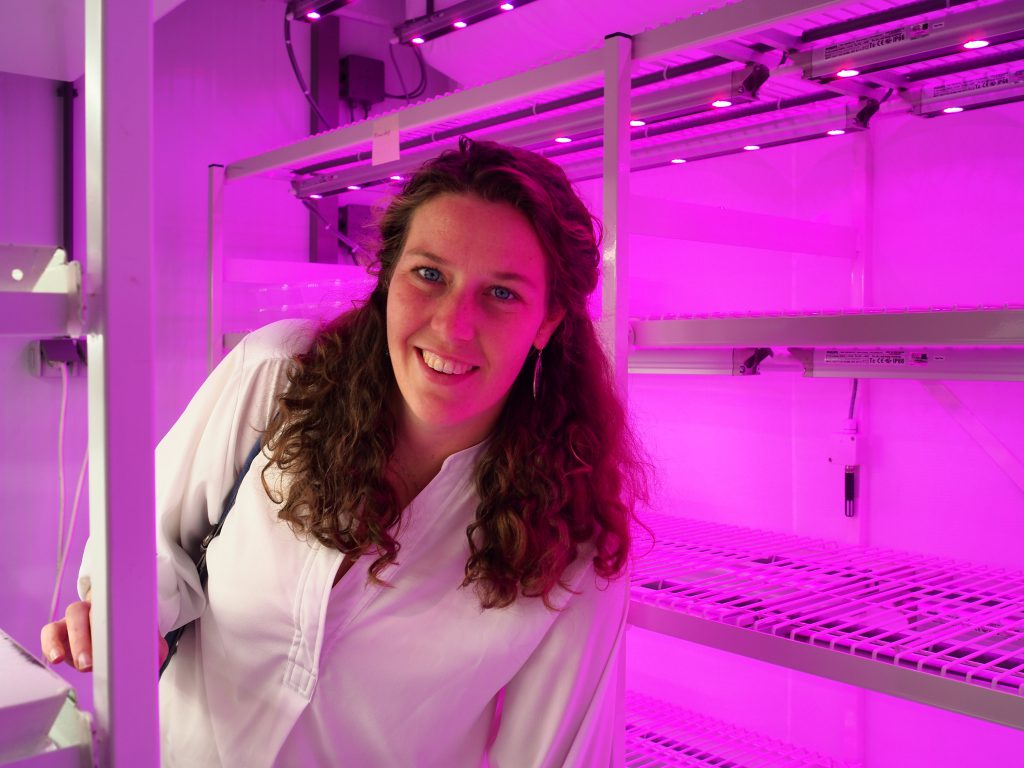Lisette Bakker is Applied Researcher at Bakker Brothers. She supports the breeding team with many different research projects. She obtained a Bachelor degree in Biology and a Master and PhD degree in Ecology. She studied at the VU in Amsterdam and at the WUR in Wageningen.
Plants are more interesting and important than you realize!
When I started my bachelor’s degree in biology, I was mainly interested in human and animal biology. However, the more I learned about plants, the more I realized that plants are amazing organisms! Plants cannot simply move to search for water and food like animals do; they have to cope with the conditions around them, even when things get rough. There are a lot of different plant species with different strategies to survive, and I was (and am) intrigued by this diversity in survival and growth strategies. Plants are the basis of food-webs and support all life on Earth, including humans! In the summers during my bachelor’s degree, I worked at Bakker Brothers seed company, and through this work, I was introduced to plant breeding. During my PhD, I noticed that I was more drawn to immediately applying the new knowledge in practice instead of writing scientific papers, so a company like Bakker Brothers was a perfect fit after my PhD.
Why did you choose for the seed sector?
This sector is societally relevant and endlessly in motion. Because of the increased availability of fresh food, people tend to forget how essential crops are
for human life and how much effort is involved in providing food for everyone. Even though fresh vegetables are one of the primary needs of life! The challenge in the seed sector is to keep innovating to provide enough healthy food for the growing population, while controlling continuously changing plant diseases. I would like to contribute to more sustainable agricultural production, for example by increasing crop diversity, and improving crop resistance to diseases and extreme weather conditions such as drought or floods.
Is there a recent project that you particularly enjoyed working on?
I have enjoyed working on all my projects so far. As an applied researcher, I support the breeding department with several research projects. I particularly like the
diversity of the projects and questions. One of my larger projects is improving the quality of our seeds. I perform experiments to establish how we can optimize
the germination quality, by considering all kinds of factors throughout the entire seed production cycle. For example, I examine the relations between cultivation
conditions of the plants and germination percentage of the seeds, when we should harvest for optimal seed quality, how we can best dry and thresh the
seeds. Another nice project that I am working on is improving the data collection of all our crops to make it easier for us to objectively select the best vegetable
varieties. Together with breeders and product developers, we considered which plant properties are most important to measure and what best method can be
used to measure and score them. To make sure that the data was obtained in a consequent manner, I made scoring tables to standardize our measurements
between all our teams involved, including people from South of Africa, Tanzania, and Jordan. This way, all collected data can be easily combined and used to
select the best varieties.
What opportunities does Seed Valley offer/present to students?
Seed Valley is THE worldwide center for plant breeding and seed technology. The development of better vegetable and flower breeds requires knowledge of
different fields such as genetics, cell biology, biochemistry, and bioinformatics. For this reason, there are many job prospects and different functions in various
companies. In this important sector, there are more than 300 new jobs offered every year. The website of Seed Valley displays an overview of all vacancies and
internships that we offer.
What do you advise students, who are on the verge of starting a career themselves?
Keep an eye out for job offers and don’t be afraid to approach people and to introduce yourself. A lot of people obtain a job by developing a network through
friends, colleagues, or family. Furthermore, it is useful to find out what you like to do in an early stage, so that the transitions between studies and jobs are smooth. I think this has helped my career go quite smoothly so far; during my bachelor’s degree, I started to determine what master’s degree I wanted to attend; in the last year of my master’s degree, I wrote a proposal for my PhD, and during the last year of my PhD, I was exploring job options at companies and institutions. Additionally, having a summer job that is related to your studies can give you valuable experience and extend your network. I think an important lesson is that you cannot influence everything, but starting to search in time often increases the odds of finding a job.


